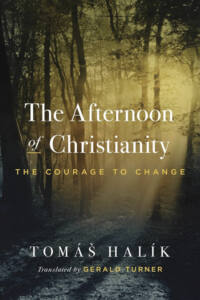
WelCom November 2024
A question of survival for Christianity
James B Lyons
‘Genuine renewal of the Church will not be generated at the desks of bishops or in councils…; it requires powerful spiritual impulses, through theological reflection, and the courage to experiment.’
This strong opinion expresses the heart of a new book by a Czech priest, theologian, scholar and pastor, Tomáš Halík, The Afternoon of Christianity, which he dedicates to Pope Francis.
The title comes from Halík’s use of Swiss psychiatrist Carl Jung’s comparison of the human lifetime with the course of a day.
In the Morning of life, the person is immature, dependent, searching for an identity.
Noonday becomes a time of crisis as what supported life earlier is no longer sufficient or attractive; there’s fatigue and dissatisfaction.
The Afternoon of life brings an opportunity to complete the lifelong process of maturing.
Halík applies the metaphor to the history of Christianity and across 16 chapters provides well researched, historical and theological arguments and experiences to suggest a most positive outlook for Christians as they live today and prepare for tomorrow.
The Morning of Christianity saw a gradual development of its brand of religion, emerging as a ‘Christian civilisation’ and the identity of the Christian faith with all things relating to society and culture. This would persist in varying ways across several centuries.
The Noonday crisis evolved with the fragmentation of this worldview. The natural sciences became a challenge to theology; the splintering of Christianity into ‘denominations’ and the warring that followed fuelled the rise of secularism. Halik judges the division of Christians as ‘one of the grievous features of the noonday crisis’.
More firmly walking the path of ecumenism, signalled by the Second Vatican Council (1962–65), ‘remains a task for the afternoon of Christianity’.
For Tomáš Halík, the greatest threat to faith today is not secular humanism and atheism but ‘a religiosity that is beyond the control of the Church’.
For instance, there may be less people at Mass or formal worship these days, but the virtues of faith, hope and love have not disappeared. They have ‘a life of their own beyond the institutional boundaries of the churches’ [p.21] and hold the potential to turn what might be considered a crisis into an amazing opportunity.
The Afternoon of Christianity opens the way to transformation – to make our faith more than just ‘going to church’!
Through technology the world is now so connected that distances hardly exist. But this phenomenon has not really brought us closer to one another.
For Halik, the greatest task of our time – and a particular challenge for Christians – is ‘to transform the process of globalisation into a process of cultural communication and sharing of true closeness’. [p 144]
The Afternoon of Christianity echoes much of what Pope Francis is pioneering in his emphasis on ‘Synodality’ – the importance of listening to one another in order to share more deeply both troubles and joys and so realise more meaningful and more lasting solutions.
There is a spirituality taking root in many places as monasteries open their doors to people seeking times of quiet and reflection; new religious movements and community groups seek to counter the ‘noisiness’ of life and the isolation many feel.
There is a climate of spiritual awareness dawning as people, powerless to personally affect events in our war-torn, damaged world, re-examine their faith and its purpose. There’s a wealth of opportunity here for Christianity.
Halík’s book is more about HOW we believe as distinct from WHAT we believe. In this, he challenges today’s Christians to show HOW they live out their faith, recognising faith as ‘a journey of trust and courage, of love and faithfulness… The greatest danger to faith today is indifference!’ [p 2]
The Afternoon of Christianity – the courage to change. Tomáš Halík, 2024. University of Notre Dame Press. Available from Pleroma Christian Supplies.